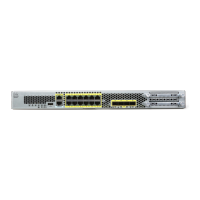11-16
Cisco Security Appliance Command Line Configuration Guide
OL-10088-01
Chapter 11 Configuring Multicast Routing
Configuring IGMP Features
hostname(config)# access-list name standard [permit | deny] ip_addr mask
The ip_addr argument is the IP address of the multicast group being permitted or denied.
• To create an extended access list, enter the following command:
hostname(config)# access-list name extended [permit | deny] protocol src_ip_addr
src_mask dst_ip_addr dst_mask
The dst_ip_addr argument is the IP address of the multicast group being permitted or denied.
Step 2 Apply the access list to an interface by entering the following command:
hostname(config-if)# igmp access-group acl
The acl argument is the name of a standard or extended IP access list.
Limiting the Number of IGMP States on an Interface
You can limit the number of IGMP states resulting from IGMP membership reports on a per-interface
basis. Membership reports exceeding the configured limits are not entered in the IGMP cache and traffic
for the excess membership reports is not forwarded.
To limit the number of IGMP states on an interface, enter the following command:
hostname(config-if)# igmp limit number
Valid values range from 0 to 500, with 500 being the default value. Setting this value to 0 prevents
learned groups from being added, but manually defined memberships (using the igmp join-group and
igmp static-group commands) are still permitted. The no form of this command restores the default
value.
Modifying the Query Interval and Query Timeout
The security appliance sends query messages to discover which multicast groups have members on the
networks attached to the interfaces. Members respond with IGMP report messages indicating that they
want to receive multicast packets for specific groups. Query messages are addressed to the all-systems
multicast group, which has an address of 224.0.0.1, with a time-to-live value of 1.
These messages are sent periodically to refresh the membership information stored on the security
appliance. If the security appliance discovers that there are no local members of a multicast group still
attached to an interface, it stops forwarding multicast packet for that group to the attached network and
it sends a prune message back to the source of the packets.
By default, the PIM designated router on the subnet is responsible for sending the query messages. By
default, they are sent once every 125 seconds. To change this interval, enter the following command:
hostname(config-if)# igmp query-interval seconds
If the security appliance does not hear a query message on an interface for the specified timeout value
(by default, 255 seconds), then the security appliance becomes the designated router and starts sending
the query messages. To change this timeout value, enter the following command:
hostname(config-if)# igmp query-timeout seconds

